
Al-Jāmiʿah Al-Islāmiyyah Patiya, better known simply as Patiya Madrasa and formerly known as Al-Madrasah Aḍ-Ḍamīriyyah Qāsim al-ʿUlūm, is a Qawmi Madrasah located in Patiya Upazila of Chittagong District, Bangladesh. It was established in 1938 by Azizul Haq under the direction of Zamiruddin Ahmad. It is also known as an International Islamic University. It has a role in the promotion of Islam in Bangladesh, inclusion of Qawmi Madrasas under one syllabus, providing modern and higher education for scholars.

Shams al-Ḥaqq ibn Muḥammad ʿAbd Allāh ibn Chirāgh ʿAlī al-Farīdfūrī, or simply known as Shamsul Haque Faridpuri was an Islamic scholar, educationist, and social reformer. He was the founder-principal of Jamia Qurania Arabia Lalbagh. He also founded many other madrasas. Organisations which he initiated include; Khademul Islam Jamat and Anjuman-e-Tabligh-al-Quran.
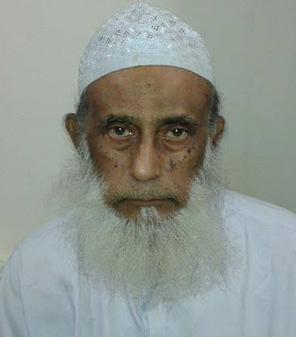
Muhammad Abdul Jabbar Jahanabadi was an Islamic scholar and secretary general of Befaqul Madarisil Arabia Bangladesh. He has been described as a pioneer to Islamic education in the erstwhile newly founded country of Bangladesh.
Sulṭān Zauq Nadvī is a Bangladeshi Islamic scholar, author and the founder of Jamia Darul Ma'arif Al-Islamia. He is known mainly for his expertise in and contribution to Arabic language and literature.
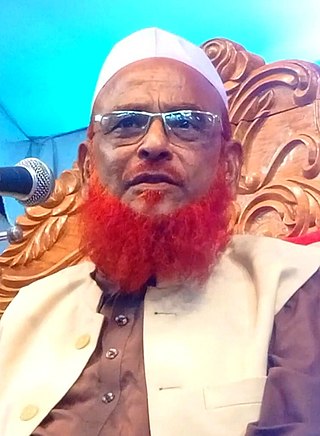
Nurul Islam Olipuri is an Islamic scholar of Bangladesh. Olipuri is best known for his interpretation of the Qur'an.

Muhiuddin Khan was an Islamic scholar from Bangladesh and editor of Monthly Madina. Khan was also a Quranic commentator, journalist, poet, writer and translator. He translated for the first time tafseer Maariful Quran into Bengali.

Al-Jamiatul Arabia Lil Baneena Wal Banaat Haildhar, popularly known as the Haildhar Madrasa is the first Qawmi madrasa having Female Branch in Bangladesh. The madrasah is founded by Allama Abdul Malek Halim.

Athar Ali was a Bangladeshi Islamic activist, author, teacher and politician. He participated in the Indian independence movement, and was former president of the Nizam-e-Islam Party. Ali was also a khalifah of Ashraf Ali Thanvi, one of the founders of the Deobandi movement.
Maḥmūd al-Ḥasan ibn Ghalim ad-Dīn Aḥmad al-Muʾminshāhawī, or simply Mahmudul Hasan, is a Bangladeshi Deobandi Islamic scholar, writer, religious reformer, educator, public speaker and spiritual figure. He is the president of Al-Haiatul Ulya Lil-Jamiatil Qawmia Bangladesh and Befaqul Madarisil Arabia Bangladesh, chancellor of Jamia Islamia Darul Uloom Madania, Khatib at Gulshan Central Jama Masjid, editor in chief of Monthly Al-Jamia and Amir of Majlis-e Dawatul Haq Bangladesh. He is the author of Tafsirul Burhanul Quran.
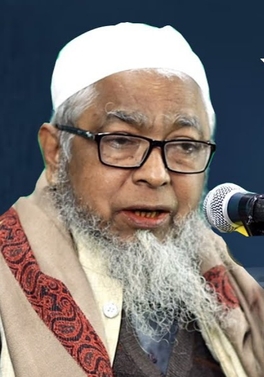
Shah Abdul Halim Bukhari was a Bangladeshi Deobandi Islamic scholar, educator, religious writer and spiritual figure. He is the former Advisor of Hefazat-e-Islam Bangladesh, Chancellor of Al Jamia Al Islamia Patiya, Secretary General of Anjuman-e-Ittihadul Madaris Bangladesh, Chairman of the Shariah Supervisory Committee of Shahjalal Islami Bank Limited, President of Organization of Islamic Conference Bangladesh and Organization of Tahfizul Quran Bangladesh, Editor-in-chief of Monthly At-Tawhid. In 2018, he was nominated as a member of the Standing Committee of Al-Haiatul Ulya Lil-Jamiatil Qawmia Bangladesh.

Syed Muhammad Rezaul Karim, also known by his title Charmonai Pir, is a Bangladeshi Deobandi Islamic scholar, politician, religious speaker and social reformer who serving as the second leader of Islami Andolan Bangladesh. He is also President of the Bangladesh Mujahid Committee and Bangladesh Quran Education Board, and the Vice President of Befaqul Madarisil Arabia Bangladesh.

Abul Fayez Muhammad Khalid Hossain is a Bangladeshi Islamic scholar and currently serves as the Adviser for Religious Affairs in the Yunus interim government since 8 August 2024. His appointment marks the first time an Islamic scholar has held this advisory role in Bangladesh. He is also the Vice President of Hefazat-e-Islam Bangladesh and serves as the Education Adviser for Islami Andolan Bangladesh. He previously held the position of President of Islami Chhatra Samaj, the student wing of the Nizam-e-Islam Party. In academia, he is a visiting professor at the International Islamic University Chittagong and has previously served as an adjunct professor at the Asian University of Bangladesh. He was also the head of the Department of Islamic History and Culture at Omargani M.E.S. College. His editorial roles include serving as the editor of the monthly journal At-Tawheed and assistant editor of Balagh al-Sharq. He serves as a columnist for four national newspapers and has authored over two hundred research articles in a range of journals, including The Muslim World League Journal. He has published 20 books and was a key figure in editing volumes 3 to 9 of the second edition of the Islami Bishwakosh and the Sirat Encyclopedia, both published by the Islamic Foundation Bangladesh.

Sajidur Rahman is a Bangladeshi Islamic scholar and educator. He is the Secretary General of Hefazat-e-Islam Bangladesh and Co-chairman of Al-Haiatul Ulya Lil-Jamiatil Qawmia Bangladesh, the highest authority of Qawmi Madrasah. He is also the Senior Vice President of Befaqul Madarisil Arabia Bangladesh, founding principle of Jamia Darul Arkam Al Islamia and Shaykhul Hadith of Jamia Islamia Yunusia.

Mufti Azizul Haq was an Islamic scholar and social reformer from present-day Bangladesh. He was the founder of Al-Jamiah al-Islamiyyah Patiya and served as its first chancellor.
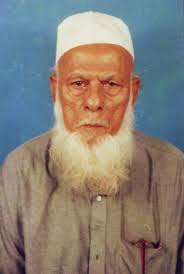
Ashraf Ali Bishwanathi (1928–2005) was a Bangladeshi Deobandi Islamic scholar, educator, politician and religious writer. He was called "Baba-e Jamiat" in order to lay the foundation of Jamiat Ulema-e-Islam Bangladesh in East Pakistan and present day Bangladesh. He was also the president of the party for 2001 to 2005. He was also the founder of Jamia Islamia Darul Uloom Madania Bishwanath, Madania Qawmia Mahila Madrasa and the literary magazine Monthly Al Farooq.
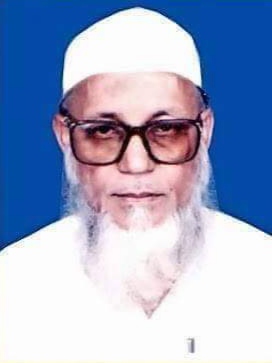
Shamsuddin Qasemi was a Bangladeshi Islamic scholar, politician, author and educationist. He was the founding president of the Khatme Nabuwwat Andolan Council, former secretary-general of Jamiat Ulema-e-Islam Bangladesh, former principal of Jamia Madania Chittagong and Jamia Hussainia Arzabad, and the founding chief-editor of the monthly Paygam-e-Haqq and weekly Jamiat magazines. He is also noted for his contributions during the Bangladesh Liberation War of 1971.
Abu Taher Misbah, also known as Adib Huzur, is a Bangladeshi Deobandi Islamic scholar, academic and author. He is the founder of Madani Nesab, and the first textbook that he wrote for it, Eso Arabi Sikhi, is read as the primary textbook of Arabic learning in Bangladesh.

Shah Abd al-Wahhab was a Bangladeshi Deobandi Islamic scholar, educator, jurist,preacher of Islam(tableeghi) and spiritual leader. He served as the second rector of Darul Uloom Hathazari, was a former vice-president of the Jamiat Ulema-e-Islam, and served on the jury of Chittagong Court for 23 years. He was an alumnus of Darul Uloom Deoband and Mazahir Uloom, and one of the important disciples of Ashraf Ali Thanwi. He is considered the second architect of the Darul Uloom Hathazari. He established several madrasas and mosques in Bangladesh and played various roles in the Bishwa Ijtema, the spread of Tablighi Jamaat across Bangladesh and Myanmar, Befaqul Madarisil Arabia Bangladesh, the Baitul Mukarram National Mosque, and the Islamic University, Bangladesh.
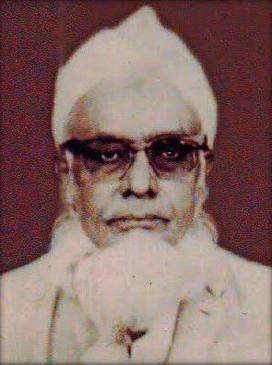
Muhammad Yunus Choudhury, popularly known as Haji Muhammad Yunus, was a Bangladeshi Islamic scholar and educationist. He was the second rector of Al Jamia Al Islamia Patiya, former president of Idarat al-Maʿarif and an active member of the Muslim World League. As the founding president of Befaqul Madarisil Arabia Bangladesh, Yunus contributed to the establishment and renovation of roughly 1500 madrasas in Bangladesh. He was awarded the title of Shaykh al-ʿArab wa al-ʿAjam by the Imam of Masjid al-Haram.

















